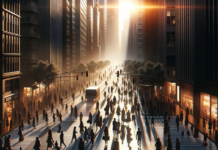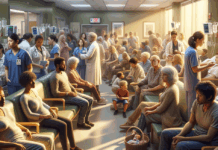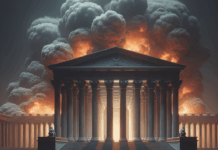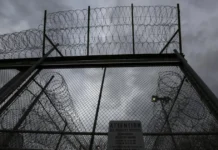From the urban teen walking into a retail store to a retired grandmother behind on her property taxes met at her front door by Sheriff’s deputies ready to arrest or discard her into homelessness; why is the public increasingly regarded as suspect offenders by major institutions?
Maybe is has a lot to do with the rich/poor gap or the struggle to maintain power in a capitalist society. The Law-and-order mantra in America has taken the country in the direction of a police state in more ways than one. It is not just about street crime, it has become a widespread practice of policing people by every means necessary in every area of life.
The object seems to be corporations and other mainstream institutions fixation on extracting as much money from the public as possible using the threat of prison or poverty as a means to stay in power. At one time people could simply rest in assurance that as long as they committed no crime, they had nothing to worry about.
Times have changed. A person could go to jail on accusations alone by a disgruntled neighbor or even a stranger. People are no longer innocent until proven guilty. Everyone involved in a dispute has to prove their own innocence in the face of video, audio recordings, and social media photos.
People are punished for missing payments through no fault of their own. They are punished for being victims of identity theft, mistaken identity and a simple misunderstanding. Everyone is a suspect if things are not going the way of the institution in power. If policy is not followed or fees are not paid, people face either jail time or poverty.
In today’s retail landscape, security cameras are almost ubiquitous. While they serve a practical role in preventing theft, they also contribute to a growing sense of distrust among customers. Shoppers often feel scrutinized and suspect, leading to an uncomfortable shopping experience that erodes trust in merchants.
Major retailers have installed self-check out yet check receipts of customers at the exit door. Either trust the public to do their own shopping or not. Double authentication is unnecessary. Products are kept behind locked glass because of a few thefts in the past, but everyone must suffer.
Banks have ramped up their security protocols significantly, implementing strict ID checks to combat fraud. However, for many consumers, these measures feel intrusive and contribute to a growing suspicion that they are viewed primarily as potential fraudsters rather than valued clients.
More banks have been involved in scams against the consumer yet treated as if they have committed a crime against the bank. Punishing fees are attached to customer accounts even if it is a bank error and it takes forever to get it corrected because of fraud protocol, people feel investigated beyond reason. They need all the personal information they can get about the customer; mother’s maiden name, dog’s name, first car and anything else they can think of to identify you.
The same goes for credit card companies, loan agencies, and any financial institution that handles the public’s money. It is understandable that fraud is a problem in society, but the lengths at which a company will go to get their money right is extremely intrusive on personal freedoms.
Government surveillance has expanded dramatically in recent years, ostensibly to ensure public safety. However, the widespread use of technologies like facial recognition and bulk data collection has many citizens feeling constantly monitored, which breeds distrust in government institutions.
Tech companies also, such as massive social media platforms gather information on people and blatantly sell it to who knows who. They leave customers no choice but to sign their livelihoods away just to sign up and use their services. In the fine print are legal threats of jail, conviction, and lawsuits if the customer does any little thing misconstrued in the fine print.
Medical and health companies will sue your pants off, report to the credit agencies any delinquent activity on your account and people end up in court anyway. The IRS will jail you; the social services will jail you, and the FBI is waiting to catch you saying something offensive online to anyone who gets offended easily. This country is a police state.
The criminal justice system’s emphasis on punitive measures over rehabilitation further exacerbates public distrust. This approach often paints a broad swath of society with a criminal brush, which erodes public confidence in the fairness and impartiality of the system. People who work hard for an honest living are nothing more than suspects.
The cops are sitting on the side of the road watching you in traffic; the security guard at work is there to haul you out if you even look like you are upset about a problem at work. People are trained to call security or the cops on disgruntled employees or customers who are merely defending their right to be human and refute a matter. Law and order is out of control.
You wake up in the morning to watch the news and the media’s focus on crime rates and sensationalist reporting can amplify public fears and suspicions. Constant exposure to crime reports leads the public to believe that the world is more dangerous than it actually is, fostering a climate of distrust both toward fellow citizens and institutions intended to protect them.
Neighbors are snitches, family members too, and strangers are the worse. Road rage can turn a person from a law-abiding citizen into a raging maniac with a minor car incident ending in someone’s death. People are gunning each other down based on pride. There are now cameras in cars that report back to the police; and the police have cameras to record abnormal behavior of suspects and spectators.
The public reaction to increased surveillance has been largely negative, with many people feeling that their privacy is being invaded. This perception can lead to increased paranoia and a breakdown in the social fabric, as people become more isolated and less trusting of their neighbors and community.
Technological solutions, such as RFID tags and automated customer tracking, are increasingly used to prevent theft. New cars have tracking devices on them and are shut off if a payment is missed or late. While effective, these technologies can make consumers feel like suspects rather than valued customers, contributing to a broader erosion of trust.
Semi-truck drivers are subject to forward and inward facing cameras to protect against accidents and lawsuits but told they are for their own safety. Cars will soon have these cameras in them also and consumers will be told they are for their protection all the while being watched by whoever as video replay will be used at every accusation.
When the general public feels constantly viewed as potential criminals, the social implications are profound. Trust between individuals and the institutions that serve them breaks down, and social cohesion suffers. People become more guarded and less willing to engage openly with one another.
As citizens feel increasingly surveilled and suspect, their trust in merchants, banks, government, and the criminal justice system diminishes, leading to a more fractured society. Children are being criminalized, old ladies, the sick and elderly, veterans, hardworking people and finally the homeless. Everyone but the wealthy are suffering at the hands of a bonified police state.
The future of reversing this distrust lies in transparency, accountability, and a renewed focus on community-building. Institutions must work to earn back public trust through policies and practices that respect individuals’ rights and foster mutual respect. Only then can the deep-rooted issues of suspicion and distrust begin to heal. Maybe punish some wealthy folks sometime for defrauding the people and go easy on average folks who are law abiding, and change can happen.
DISCLAIMER: The content of Pro Liberation is firmly opinionated and is not meant to be interpreted as official news. We glean facts and quotes from mainstream news websites and abridge its meaning for readers to relate. We do not indulge in misinformation, conspiracy theories, or false doctrine but choose to express our right to free speech as citizens of this country and free born under God the Creator. We represent Nu Life Alliance Inc. a non-profit organization in the battle for social and economic justice. Donate to our cause at the following link. DONATE














